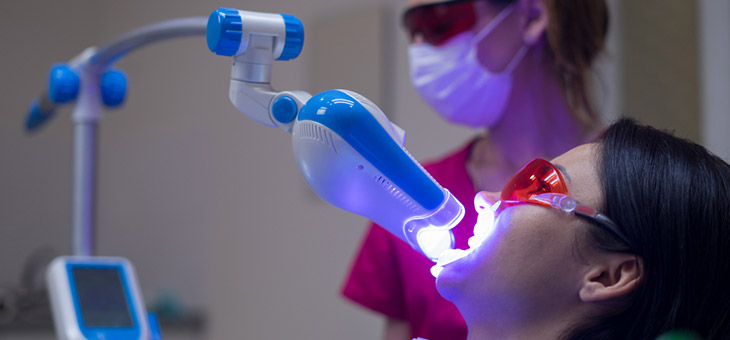We all covet white teeth. Well, I do anyway. Looking back through photo albums, the discolouration wrought by decades of eating – and no doubt coffee, red wine and beetroot were the chief offenders – is obvious. They used to be white, but alas, no longer.
I don’t want sunglass-dazzling celebrity-bright pearly whites, just a whiter shade of what I’ve got. But no chemicals, please. So is that possible? And can I get any joy with a home product?
Alexander Holden, a lecturer in dental ethics, law and professionalism at the University of Sydney, says products that don’t contain or release hydrogen peroxide are unlikely to be very effective in whitening teeth. There goes the quest for a chemical-free solution.
For those who are happy to use a peroxide-based whitener, he explains that there are different rules around permitted concentrations in different countries.
“In Australia, only a dental practitioner may provide products that release more than 6 per cent hydrogen peroxide,” he told The Conversation. “In New Zealand, non-dentists may apply up to 12 per cent hydrogen peroxide to whiten teeth. In the UK, it’s illegal for anyone other than dentists to use concentrations higher than 0.1 per cent.
“Dentists in Australia are able to use high concentrations of hydrogen peroxide. Some in-chair whitening systems use 35 per cent hydrogen peroxide. At this concentration, hydrogen peroxide can effectively permeate deep into the enamel structure. Weaker concentrations act only at the surface of the tooth enamel.”
Consumer advocacy group CHOICE warns that the teeth-whitening industry is largely unregulated and that practitioners in salons don’t necessarily have any dental training.
“Practitioners can’t advise on whether the process is appropriate for you (some kinds of discolouration don’t respond to certain treatments), and they’re not qualified to check for problems such as cracked enamel, cavities, restorations and exposed root surfaces that need special care,” CHOICE says.
So what about home whitening products?
According to research, home whitening can damage teeth over time. Products can increase the loss of mineral content within enamel and cause weakness.
Dr Holden says home systems should be used under the supervision of a dentist, and cautions that consumers should investigate what ‘peroxide-free’ products actually contain.
However, many dentists, including mine, offer whitening treatments that can be taken home. I had a mould made and took home a tray of bleach in individual syringes. I used about three, felt sick, noticed no difference and abandoned ship. But you might have more joy.
The mould helps to ensure the treatment touches your teeth only and not your gums. Hydrogen peroxide should not be left in contact with gums for a long time as that can cause burns.
So what about toothpastes and home remedies?
Dr Holden says: “Toothpastes that contain charcoal have increased in popularity in recent times. Some promote these products as beneficial for oral health and teeth whitening. However, a recent review in The Journal of the American Dental Association found insufficient evidence to support these claims.”
On home remedies, he said: “It doesn’t take too much searching to find a huge range of home remedies for teeth whitening. From rubbing banana peel on your teeth, to brushing with a mixture of lemon juice and bicarbonate of soda, there are lots of quick-fix teeth-whitening solutions. While many of these home remedies simply don’t work, many contain acids, sugars and powerful abrasives, which may lead to tooth damage and poorer dental health if used routinely.”
His verdict?
“Treatment by dentists typically costs more, but comes with more assurances for patients. Dentists can use stronger products, are more likely to understand what is achievable with each type of whitening (office-based or home) and can also help more effectively if anything goes wrong.”
Have you tried whitening your teeth? Did you go to a dentist or have you tried a DIY product? What worked?

